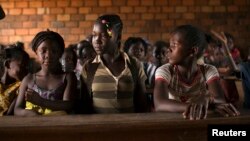The U.N. Children's Fund says about 10,000 children in the Central African Republic have not been in school this week because armed groups are occupying their classrooms.
School started last week across the Central African Republic, but UNICEF says about 400 schools have been affected in provinces outside the capital, Bangui. That amounts to one-fifth of the country's primary schools and one-third of the nation's children.
Herve Verhoosel, spokesman for the U.N. peacekeeping mission in the country, told VOA he thought the rebels were specifically trying to block access to educational resources.
"In some cases, [the rebels] are not even using the schools as a place to sleep," Verhoosel said.
Elsewhere, they have set up checkpoints on roads near the schools, deterring parents and children alike with the threat of violence.
"In that case, it's clear that the reason is they want to deny access to education to those kids," he said.
He said the gunmen were members of several different armed groups operating around the country, and he vowed that the U.N. mission, known as MINUSCA, would strive to get them out.
"If they don't leave those schools, if they don't leave those 10,000 children to have the education they deserve, MINUSCA will use all that we can use in those cases to protect the population," he said.
Education access limited
UNICEF spokeswoman Donaig Le Du told VOA that the problem has been going on for several years. She said access to education is a challenge because some parents need their children to work, some parents are too poor to send their children to school, and some children have been recruited by the armed groups.
Compared with other countries, CAR has one of the highest number of children associated with armed groups in proportion to the population, Le Du said. "Since 2013, basically between 6,000 and 10,000 children have been associated with armed groups," she said.
Le Du said UNICEF tries to work with the armed groups to release the children and allow them to resume a normal life, including schooling or vocational training. But, she said, "there are still hundreds of children in the Central African Republic who are currently used either as combatants or cooks, help, or sexual slaves for different members of those armed groups."
"This has to stop," she said, noting that the country, plagued by civil unrest, has historically been a very difficult place for a child to thrive.
"You cannot have another generation of kids growing up without health services, without being able to be immunized, with 40 percent of children under 5 years of age who are chronically malnourished," she said.
'We will be very firm'
MINUSCA's Verhoosel said peacekeeping forces were doing everything they can to protect the population and reclaim the schools from the armed groups.
"We'll ask them to leave without condition and without any negotiation," he said, "and in the coming days we will be very firm with those who won't accept to leave under those conditions."
On November 17, a group of government leaders from CAR is scheduled to meet with international partners in Brussels to discuss policies designed to stabilize the country over the next three to five years.




